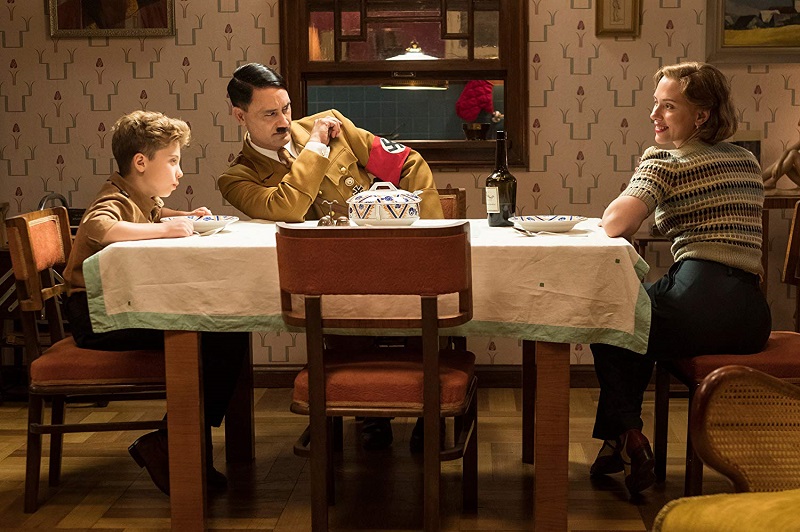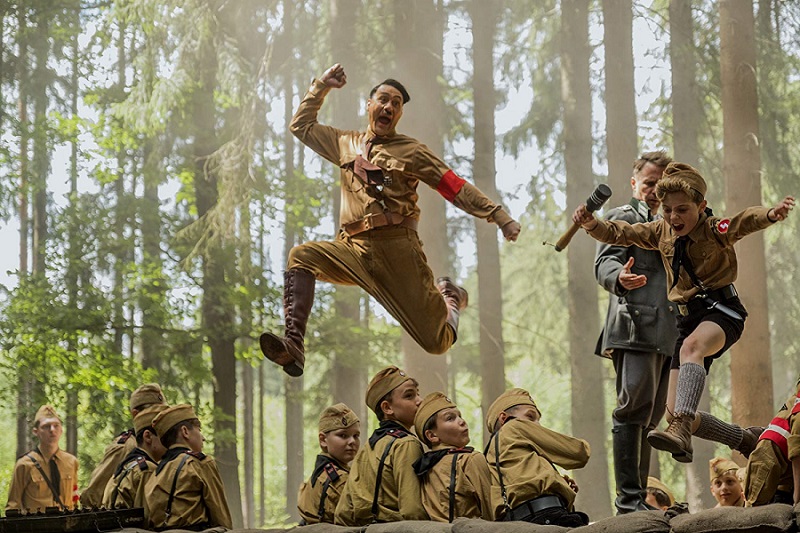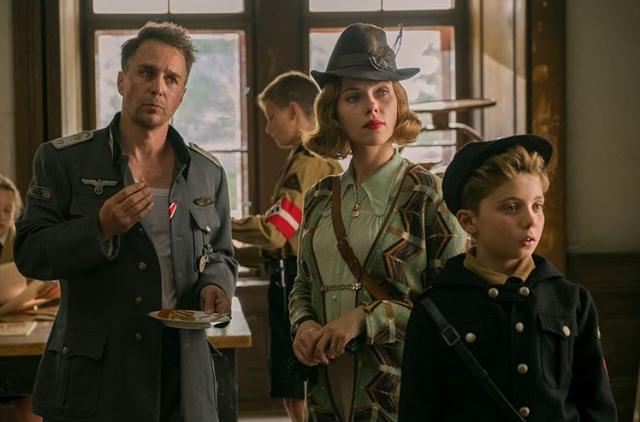Taika Waititi learned a long time ago that using humor to tell piercing truths is a filmmaker’s gift. He employs that tactic brilliantly and dare I say beautifully in his latest, Jojo Rabbit. The film chronicles the closing months of World War II for one of those prized Hitler youth, Jojo (Roman Griffin Davis). He is 10-years-old and knows nothing else but the propagandized party line that has him, as the film commences, ready for the best weekend of his life as he heads off to what essentially is a Nazi camp.

The other thing about Jojo … he has an imaginary friend. Nothing odd here, many children have them—it’s just that our little German wunderkind’s not-there BFF is Adolf Hitler (Waititi). He is a cartooned incarnation of the notorious leader and as played by the writer-director-star, he embodies the truth of one of history’s most evil souls, but also takes a lot of latitude in the characterization, including injecting some more modern-ish phrases into the Führer’s vocabulary.
The reality of the war games that Jojo has been playing comes home to roost when he learns that his mother Rosie (Scarlett Johansson) has been hiding a Jewish girl named Elsa (Thomasin McKenzie) in the wall off the room of his deceased sister. Over the course of Jojo Rabbit the truth of what the Germans are doing to Jews and other oppressed peoples comes blindingly clear to the titular character. There’s also the lies and myths about Jews that are perpetuated by the Nazis that are manifest in a book that the young boy is writing to help his people find Jews. All those stereotypes, from they have horns on down the list, wind up in Jojo’s book. Yet, while he’s writing it and “learning” from his mother’s houseguest (which he keeps his knowledge of from his mother), Jojo is finding a humanizing element to Elsa. That goes against everything he’s been indoctrinated by within the the German societal norms that pervaded German life under Hitler.
Johansson’s Rose is the perfect wartime parent, who is doing everything she can to provide the most “normal” of upbringings as possible … given the winds of war that engulf the planet. The actress plays her, on one hand, helpless against the propaganda machine that has enslaved her son’s mind, yet finds resistance in a big way by saving one Jewish life. Jojo’s father, and her husband, is “off fighting the good fight” and at the beginning of the film, we’re led to believe he’s a German soldier on the front lines. The truth is likely much different.
We first meet Captain Klenzendorf (Sam Rockwell), Fraulein Rahm (Rebel Wilson) and Finkel (Alfie Allen) at that weekend camp. They play the most righteous of roles once Jojo makes his way home from that “glorious weekend.” All three are working the Nazi headquarters that focuses on Germany’s youth. History has told us that as the war wound down to its defeating conclusion for Germany, those youthful kids were handed guns as soldiers started to be in short supply. Waititi firmly takes a sarcastic and played for laughs angle to this landscape. Klenzendorf is portrayed as a drunken nincompoop with a fake eye who would rather be on the front lines than overseeing the soldiers of tomorrow. Wilson’s Rahm is “thrilled” to be a woman in Hitler’s Army, complete with its responsibilities of nursing, making beds and “getting pregnant.” The Australian actress nails it and her comedic disdain for her character’s role in this war is hilariously palpable. The two of them give Jojo Rabbit a slapstick/farce realm that recall past forays into this historically comic realm such as Catch-22 and M*A*S*H. Yes, the film belongs in that company and in many ways exceeds what those films were able to achieve. Not only does Waititi’s film point its jaded eye at the German war machine and the mass extermination of a people, but also firmly at the entity that is global warfare and how it puts people in charge of life and death who would likely not be held responsible for completing a restaurant order correctly.
Waititi’s Hitler shows up just when Jojo needs reassurance and those scenes are comedically priceless. But they also contain a heavy dose of matter-of-fact expose of the horrors of xenophobia as used as a political weapon. His characterization also serves brilliantly as the barometer of the film itself. At the beginning, it is a major laugh-out-loud moment to see Hitler and Jojo running through the woodsy forest as the boy grabs a hand grenade from Klenzendorf and the two dance, utterly goofily, across the landscape until Jojo throws the weapon with powerful panache. Then, as Jojo is at home, Waititi’s Hitler (rightfully so), witnesses firsthand how his poisonous propaganda has an equally powerful antidote—the truth.

Rising above all of it is the eleven-year-old brilliance of Davis. The entire film rests on his young shoulders and he could not have been more impeccably cast. The scenes with him and Hitler are priceless as both actors have the most stunning of chemistry collectively. Davis and Johansson are a wartime mother and son that we feel as deeply as possible. Meanwhile, Davis and Rockwell have the most touching of relationships that evolve from jolted disdain to an empathetic embrace. Then, there are the scenes where Davis is allowed to be a boy with his (real life) friend, Yorki (Archie Yates), who utters one of many of the best lines in the film with “it is not a good time to be a Nazi.” Even as the world is falling apart all around them, it is a joy to witness Davis and Yates embody those boyhood basics that touchingly adds emotive layers to Jojo Rabbit.
The heart of the film is the evolving relationship between McKenzie and Davis. At that core lies the entire argument for the war itself. Jews are bad. Jews horde money. Jews will eat us alive. It doesn’t take too long, once you have actually met one, to see that none of that is true. That is why I found that Jojo Rabbit is a remarkably timely and timeless movie miracle. One could insert any segment of the population for the word “Jew” and you have someone’s argument for why those groups should be excluded from the general society. As McKenzie and Davis’ friendship is fostered, the hate of the outside world seems to melt away on the surface, while we all know that the only thing that will make it truly go away in this time and place is the arrival of Allied forces and the full expulsion of the Nazis.
In the hands of the two young actors, as penned so eloquently in the screenplay by Waititi, both characters have the richest of arcs that intertwine together in the most touching of ways that finds the film adding up to one of the most rewarding emotional, hilarious, powerful, entertaining and enlightening films of 2019.

Waititi has slowly, but surely, established himself as one of our most gifted storytellers. His work with What We Do in the Shadows, Hunt for the Wilderpeople and Thor: Ragnarok has all been a steppingstone to Jojo Rabbit. The intimacy of the first film, coupled with the Marvel Studios majesty of his God of Thunder flick, have forged a filmmaker, writer and actor whose dazzlingly created a Jojo Rabbit that is a titanic triumph. We are lucky to live in a time when the New Zealand auteur is bringing his spotlight to our world and shining his light to illuminate some darker times.
Grade: A+

